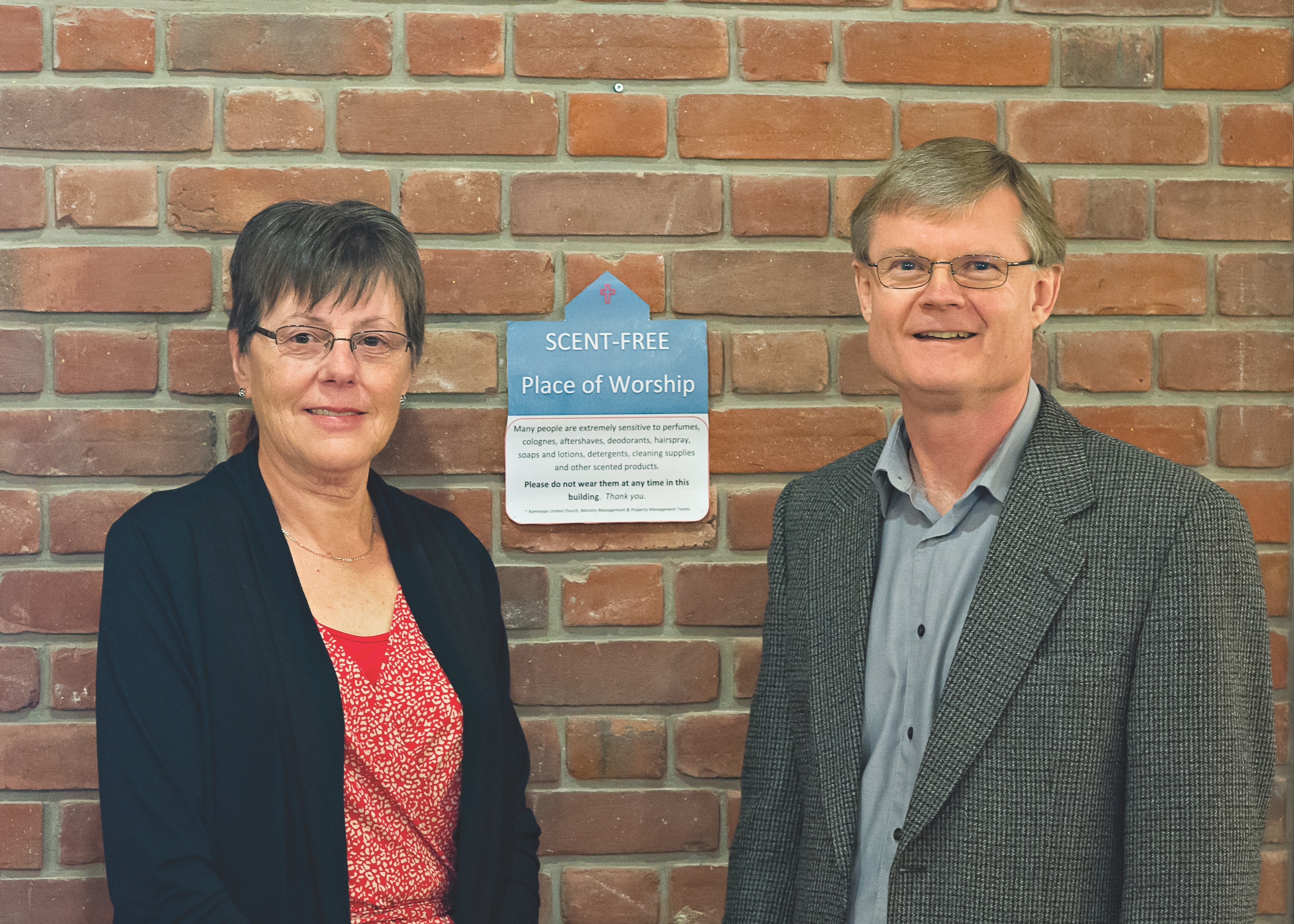Linda Nelson stopped going to church 20 years ago because it literally made her sick. She was diagnosed with multiple chemical sensitivity — which made her allergic to everything from cologne to car fumes — after working at a job that exposed her to pesticides for more than a decade. For the first few years after her diagnosis, Nelson, 64, had seizures on a daily basis.
“Just opening the door to my backyard and getting a whiff of the dryer sheet while my neighbour was doing laundry was enough to cause a seizure,” she says.
You may unsubscribe from any of our newsletters at any time.
For years, Nelson rarely left home. She often felt isolated, alone and misunderstood. Then four years ago, after moving to Kamloops, B.C., she learned that the local United Church had a scent-free policy. “I couldn’t believe it,” says Nelson. “I thought, well, I have to check this out.”
Joining Kamloops United gave Nelson the sense of belonging she had been missing. Not only could she attend services, but she also made new friends and got involved in pastoral care. All because she could breathe easy when she set foot inside the church.
“It’s made my life so much richer,” she says. “I feel like I’ve found a family that cares about me. I’ve never been happier.”
One million Canadians experience extreme physical symptoms similar to Nelson’s when exposed to chemicals in the air, according to the Canadian Human Rights Commission. Their symptoms can range from runny eyes and nose to headaches, fatigue, pain, nausea, and breathing and digestive problems. Scented products can also worsen the condition of the 15 to 20 percent of the population who suffer from breathing problems such as asthma and allergies, according to the Lung Association.
An increasing number of United Church congregations are going scent-free in an effort to be more welcoming to people with these sensitivities. “We have a big banner outside our church that says, ‘You are welcome here,’” says Rev. Bruce Comrie of Kamloops United. “If we want to live up to our values, we need to be aware of how serious an issue this is for some people.”
Is it time your church considered going scent-free? Here’s some advice from those who have done it.
Create an official policy
You don’t have to start from scratch. Your church can adapt the scent-free policies developed by both the Canadian Centre for Occupational Health and Safety and the Lung Association. Determine if your church will go completely scent-free, considered the ideal by people with sensitivities. If that’s too difficult, some churches, such as Camrose (Alta.) United, have a designated scent-free area. Still others, such as Carleton United in St. Catharines, Ont., hold separate scent-free services.
Communicate and educate
When St. Andrew’s United in Beaverton, Ont., passed its scent-free policy earlier this year, Mike Bishop, the chair of the Board, announced it from the pulpit during a Sunday service. “It was a good way to get the message out to a lot of people at one time,” he says. The policy is also posted on the church bulletin board and website, and signs indicating the church is fragrance-free are posted at all entrances.
At Kamloops United, the minister discussed the policy during the children’s time. “We talked with the kids about how it’s a lot like peanut allergies — there are some people who are good with scents and some people who have great difficulty with them,” says Comrie. The church also included a handout in the bulletin with a list of alternative scent-free products and where to get them.
First United in Kelowna, B.C., highlights the policy as a rotating message on its PowerPoint screen each Sunday.
Enforce with sensitivity
One woman, who didn’t want to be named, was part of a church committee that included a person with severe allergies who asked if members would not shower or wear freshly laundered clothes the day of their meetings. Everyone agreed, but when the woman washed her hands with soap in the washroom before a meeting, she was challenged by the person with allergies and asked to move to the other end of the table. “I thought that was going too far,” she says. “I was prepared to be co-operative, but I don’t see how we can be so restrictive when we are in community with each other.”
Rev. Karen Medland, a minister at First United in Kelowna, says enforcing a scent-free policy requires plenty of diplomacy. “There has to be grace on both sides, and when people have gone to the extent to be as fragrance-free as they can, maybe that’s all you can ask. Perhaps the graceful thing to do in this situation would have been for the [allergic] person to move.”
Care also needs to be taken when dealing with newcomers or infrequent churchgoers, who may not be aware of any scent-free policy. St. Andrew’s United has designated specific people to broach the topic delicately with parishioners, if needed.
“We don’t want people to feel ashamed and guilty. That’s not what we’re about as a church,” says Comrie. “People are being asked to change their personal grooming habits and seek out other products — and that can feel like an imposition. But once people understand it’s a serious health issue, it becomes easier to change behaviours.”
Embrace inclusion
The purpose of a scent-free policy is to make it possible for everyone to participate fully in church life. “We’ve framed our scent-free policy in the concept of radical hospitality,” says Medland. “Jesus sat at the table with Judas and shared bread with him. That’s how radical we have to be. This is not a preference issue for some people; it’s a health risk. God calls us to be an open and inclusive community, to be welcoming to everyone.”
Seven ways to make the change
You wouldn’t dream of lighting up a cigarette in a public building or allowing your child to bring a peanut butter sandwich to school, yet these used to be commonplace activities. Going scent-free is the next frontier in ensuring we aren’t putting those with environmental allergies at risk. Here’s how to do it:
1. Look at the label. Buy products labelled “fragrance-free.” Products marked “unscented” may contain masking agents designed to cover up scent.
2. Don’t wear perfume, cologne or aftershave. Once made from natural ingredients such as flowers and herbs, today these products are almost completely synthetic.
3. Opt for fragrance-free toiletries. Many well-known brands have fragrance-free versions of their products. Canadian Mennonite University in Winnipeg has a good list of suggested products on its website.
4. The same goes for laundry and cleaning products. Laundry products are often a trigger for people with sensitivities. Use only fragrance-free detergents and ditch the fabric softeners and dryer sheets, as these can be especially harsh. Churches should avoid cleaning products that have fragrance, chlorine bleach, ammonia and other chemicals.
5. Forgo the flowers. Certain flowers and plants — including Easter lilies and pine boughs — carry a stronger scent than others and can cause problems for people with environmental allergies. First United in Kelowna, B.C., replaced its fresh floral arrangements at worship services with silk plants, and the janitorial staff ensures fresh flowers are removed immediately after weddings and funerals. St. Andrew’s United in Beaverton, Ont., reached out to the lone flower shop in town to ask it to recommend less fragrant blooms when people call in to order arrangements.
6. Toss the air fresheners, scented candles and incense. These are full of fragrances and chemicals. For candles used in services, choose unscented or beeswax varieties. Keep air fresh by using an air purifier and dehumidifier.
7. Post alerts. If your church is undergoing renovations, post notices in advance to allow people with sensitivities to avoid the property for a certain period of time, since building materials can contain harmful chemicals.
***
This story first appeared in The United Church Observer’s November 2013 issue with the title “Time to clear the air.”














